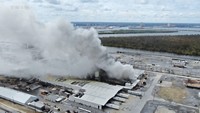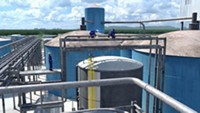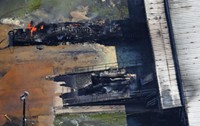Advertisement
Grab your lab coat. Let's get started
Welcome!
Welcome!
Create an account below to get 6 C&EN articles per month, receive newsletters and more - all free.
It seems this is your first time logging in online. Please enter the following information to continue.
As an ACS member you automatically get access to this site. All we need is few more details to create your reading experience.
Not you? Sign in with a different account.
Not you? Sign in with a different account.
ERROR 1
ERROR 1
ERROR 2
ERROR 2
ERROR 2
ERROR 2
ERROR 2
Password and Confirm password must match.
If you have an ACS member number, please enter it here so we can link this account to your membership. (optional)
ERROR 2
ACS values your privacy. By submitting your information, you are gaining access to C&EN and subscribing to our weekly newsletter. We use the information you provide to make your reading experience better, and we will never sell your data to third party members.
Industrial Safety
Chemical Safety Board finalizes investigation into Arkema fires following Tropical Storm Harvey
Agency urges the chemical industry to better prepare for extreme weather
by Jeff Johnson, special to C&EN
June 3, 2018
| A version of this story appeared in
Volume 96, Issue 23

The U.S. Chemical Safety & Hazard Investigation Board (CSB) is calling on chemical companies to better prepare for the growing likelihood of a future of flooding, hurricanes, and extreme weather events. The board’s recommendation springs from fires last year at the Arkema chemical facility in the Houston area during Tropical Storm Harvey.
CSB released its guidance and final report on the Arkema fires on May 24. The Arkema plant makes organic peroxides used to produce consumer goods, such as polystyrene cups and plates.
A facility warehouse stored some 159,000 kg of reactive organic peroxides that needed to be kept at temperatures below freezing to avoid decomposition and combustion. Peroxides are held in relatively small containers to allow for heat dissipation and to prevent self-ignition.
In late August 2017, Harvey stalled over the region, dropping more than 50 cm of rain in the Houston area. As flood waters rose, the warehouse lost primary and backup power. Workers transferred some 10,000 containers holding organic peroxides by hand in driving rain to nine refrigerator trailers. Then the trailers also began to lose power.
Eventually three of the trailers caught fire, and soon the company was forced to ignite the others in a controlled burn. Some 200 nearby residents were evacuated and 21 people, mostly emergency responders, sought medical treatment for smoke inhalation.
What happened to Arkema could happen to other chemical companies, CSB warns in its report.
It urges companies to analyze their susceptibility to extreme weather events by evaluating flood maps and other material to determine if any portions of their plants are vulnerable. Companies should then prepare safeguards based on that analysis. CSB recommends such information be included in a facility’s process safety management program.
The board also recommends that the Center for Chemical Process Safety (CCPS), a nonprofit, industry organization, develop guidance to help companies evaluate the likelihood of weather-related problems and options for how to respond.
In addition, the board repeats a 20-year-old recommendation to EPA to add reactive chemicals, such as organic peroxides, to its list of potentially hazardous substances covered under federal risk management program provisions that call for added facility safeguards.





Join the conversation
Contact the reporter
Submit a Letter to the Editor for publication
Engage with us on Twitter